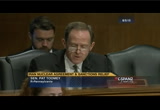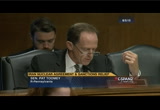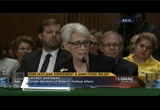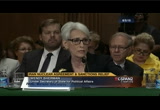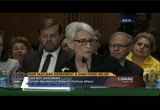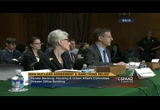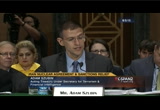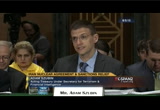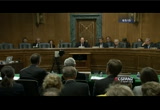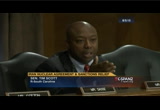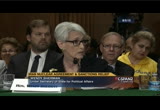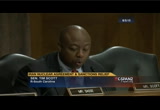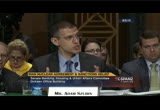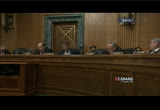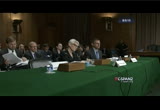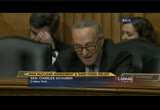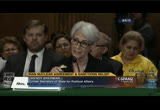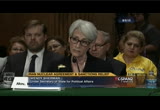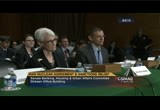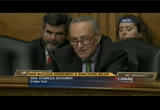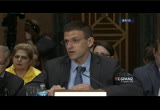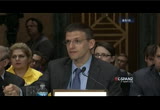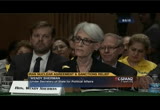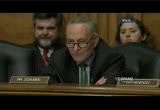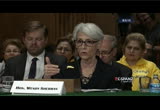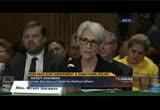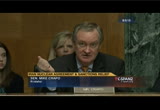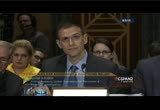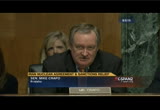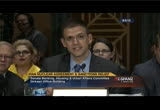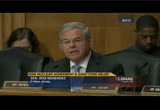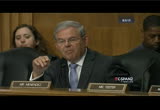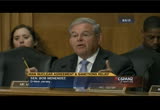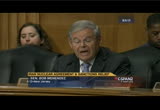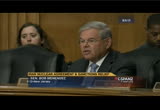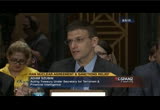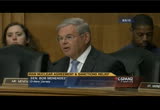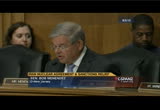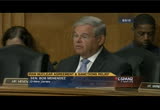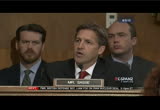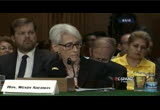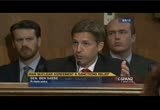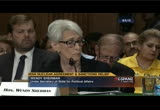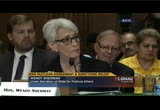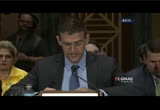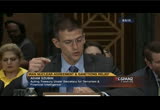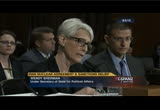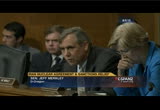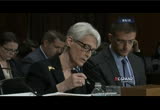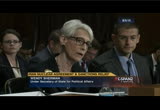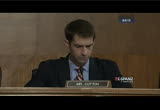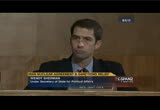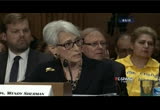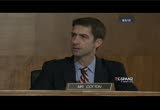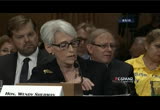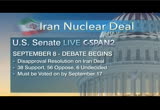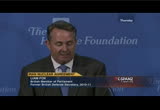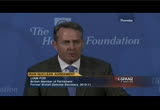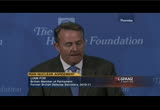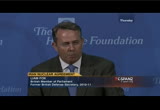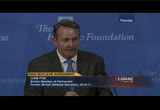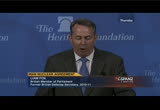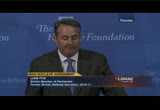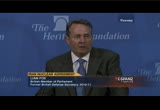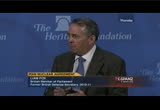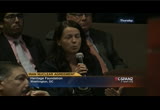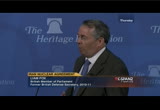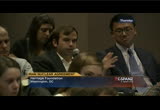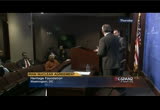tv Key Capitol Hill Hearings CSPAN September 4, 2015 2:00pm-4:01pm EDT
2:00 pm
>> i'm glad you do that is a document we ought to have before us. but we ask we ask a separate question thirty-six of the jcpoa grains to either party the opportunity to walk away from the agreement. anybody can raise an objection about what the other side is doing. and after him and adjudication process that seems to me that lasts about 35 days of this objection is not resolved to the satisfaction of the complaining participant, the complaining participant can simply walk away. either side. so iran any reason they are deemed inefficient they can walk away from this and of course that would be after they have the 50 or $100 billion, whatever the figure is. ..
2:01 pm
of any kind, iran could evoke paragraph 36 decide this is as unacceptable and they are what gateway, and since this administration has told us so many times so forcefully that the alternative to this is war and so we have to have this agreement and we had to make all these concessions after concession after concession to get this agreement why should we believe that in the face of the accumulation of these small but
2:02 pm
accumulating evasions that the administration is going to risk iran walking away from the table because i suspect that's pretty likely that would be their threat. >> senator i appreciate that you believe that iran will have gotten the sanctions released, and they will be sitting in the driver seat, but you seem to forget the other half of the equation. iran will have centrifuges reduced by two-thirds. they will have eliminated 90% of their stockpile. they will have made the iraq reactor in operable. they will have allowed inspectors in their country to have 24/7 access to their facility. >> 24 day access. >> now, for the declared facility iraq the iaea has 24/7 aspects everyday of the week, 365 days a year.
2:03 pm
the military side, if the iaea believes there is justification for them going to a site the additional protocol allows them to give 24 hours notice to get into that site. if the country in this case iran says actually we think you should go to the site or we think you should have this document under the additional protocol they are allowed to suggest an alternative however under the additional protocol that debate about what the iaea can do can go on for quite some time. so with this agreement did, different than any other arms control agreement ever negotiated, we put a clock on that debate. we said that if the iaea under the additional protocol wants to go to a site, it has to have access to that site. and so we said you can debate with iran for two weeks. at the end of those two weeks the joint commission which is made up of all of us looks at
2:04 pm
that. if we believe on day one of the seven days we have to consider the situation, that they ought to give back, five out of eight of us believe the iaea should get access and we believe we will have a high representative with us. iran has three days to provide access so that the most is 24 days but it could be assured as 18 days and a secretary moniz had testified again and again and again nuclear materials cannot be cleansed away. it will be found if it is there so quite frankly senator what we have negotiated in this agreement is absolutely unprecedented access whenever the iaea believes that it has a suspicious site that needs access to. >> senator would be permissible to address the snapback epic? >> at the discretion of the chairman. >> you are next.
2:05 pm
>> i will take my time and asked quickly to respond. >> i wanted to speak to one of the premises that i think is behind your premise of snapback. i utterly agree the more likely scenario we see is small breach. sticking a toe across the line of what we need to do is obviously show them those breaches have consequences otherwise we are asking for larger breaches and we have to be very serious about that. we have been very clear with our partners that we are going to be very serious about that, but there is a premise that i have heard circulating that after the initial sanctions released iraq could somehow immunize itself to further pressure and therefore it won't care about snapback and that's just simply not the case. iran's foreign reserves can be
2:06 pm
put in a fault or a mattress in iran in the form of gold or bills. if so they are not liquid and they are not usable. what iran needs with its foreign reserves as with would every country needs of which is to have them major financial centers usable to boost their currency a whole list of things or countries do with their foreign reserves. that means they're going to have to keep them in foreign jurisdictions where they are subject to snapback. if anything the more iran begins to benefit from a deal the more vulnerable they are to this pressure so we need to be very serious and i agree with your question in that respect but the consequences to iran will remain, very serious and very severe throughout this agreement >> thank you very much mr. chairman and within my allotted time secretary szubin you don't expect to stop funding hezbollah so what will you do to combat this? >> unfortunately i do expect to continue to see iran funding
2:07 pm
hezbollah and their other proxies and it's extremely troubling and it's frankly what i have devoted the bulk of my career to combating. i've been working 13 years on the terrorist financing portfolio because of how serious of a threat i believe that to be. we have a lot of tools at our disposal here and frankly one of the most powerful is the one congress has given us which is that when we sanction iranian terrorist supporters are designation is amplified internationally. what i mean by that is when we name hezbollah financier and money launder everything worldwide not just american banks, any bank worldwide that facilitates transactions for that designated entity faces very severe sanctions from the u.s., sanctions that no bank wants to face and so what we have seen as a practical matter to those congressional sanctions is that our sanctions against iran's carry this international weight in those entities become pariahs worldwide but we need to
2:08 pm
do more and i think it's incumbent upon us to do more in terms of additional intelligence targeting to be able to identify the money launders that the facilitators and funders and to muster the coalition of countries who care about this to cut it off and to shut it down. >> thank you. let me just go to a very critical point here and the sanctions regimes is in place today. if we reject this arrangement, this deal some have argued well it won't made a difference. the sanctions will stay in place and making keep them in place. you have been working on the sanctions for 10 years. how would our partners react if we said, if we walked away from the deal? >> from my perspective and i'd certainly defer to ambassador sherman on the pariah perspective but from a sanctions perspective we have tremendous clout, tremendous influence in
2:09 pm
the united states is the world's most powerful economy when it comes to our moral sway, when it comes to our sanctions and economic sway. i do not underestimate that. i've had the privilege to be a part of exercising that for the last 10 years and i've seen first-hand how effective it can be that as i mentioned in my opening statement it is not all-powerful. we don't simply get to take aid from other countries especially major economies what their foreign policy will be. we need to harness shared concerns. when it comes to iran we have a shared concern. for u.n. security council to call about iran's nuclear program is being a threat and so when we went to china and then we went to india south korea and japan to say you need to work with us we had to be -- have powerful sanctions in place. we don't want to use them but you agree with those that iran's nuclear program is a threat and they said yes we do agree it's a threat and we said here's a way to address it. we have got a diplomatic path forward.
2:10 pm
join us and let's tested. let's see if we can use our sanctions leverage to obtain the nuclear concessions they'll need from iran. they worked with us and it succeeded i think to a remarkable extent. in the event that we walk away it's a very different and much bleaker scenario. the international consensus as ambassador sherman described is behind this deal. 90 countries come out and endorse this deal. we would be alone walking away from it and in that event asking them to take very costly economic sacrifices in the hope of a future much better, much tougher deal that i think they would doubt the ability of, i think we would have very weak prospects for that. >> thank you and mr. chairman i think i will stop. >> thank you mr. chairman and good morning. thank you all for being here. i, like so many of us and very concerned about this deal, not supportive of it whatsoever and the more i read of the deal the
2:11 pm
less i like it and that doesn't include the parts that i do not know about, the iaea side agreements. ambassador you have said a couple competent things this morning in my perspective. sitting here i can see your notebooks. i can't read what is in it. in the final deal the iaea have you seen it and read it? >> let me be very clear. i have seen the documents that the iaea and iran discussed to create the final arrangements for the modalities that underpin the roadmaps, the document being a public document that congress has a copy of. i was not allowed to keep any of the documents about the arrangements on the modalities that underpin the public roadmap that you have a copy of.
2:12 pm
i told the iaea that given our constitution that congress asks me to brief on the details that i understood i would do so in a classified session and i will do so this afternoon in the authentic classified session. i will give you all the details of which i am aware. >> have you read the final agreement? >> it's not an agreement. it is a set of arrangements. >> heavy read it? >> i have. >> a question please. secretary you stated earlier that the regime continues to fund terrorism and bad behavior. at the same time we are concerned that as both of us have commented on are concerned the more money day reigning regime has the more they will fund terrorist activity. in spite of the fact that they have a crumbling economy, they haven't the structure needs,
2:13 pm
they have needs to repair their ability to sell more oil and yet in spite of all of that there is still funding of terrorism. it seems to me that you would agree with national security advisers susan rice when she said that we should expect that some portion of the money from sanctions relief will go to the iranian military and could potentially be used, as you said will be used to fund more bad behavior and terrorist behavior in the region in spite of the state of their economy. >> thank you senator. i do agree with the premise of your question. i agree with the statement that you quote from former national security advisor rice. we have seen iran funds terrorism before the sanctions through the period, the toughest. necklace sanctions. we seldom found these groups are the iran-iraq war when their economy was in shambles and i expect we'll continue to see that. the question is whether we do about that and if my offices responsibilities along with our colleagues in the interagency
2:14 pm
and intelligence committee to ramp up our efforts to be able to go after those funding streams. the alternative so that i think is put out there doesn't make sense to me strategically, which is that we don't enter into a nuclear agreement. we don't give them back their money. in other words we don't do the exchange of securing a nuclear nuclear -- in exchange for sanctions regimes and then what? we will continue to combat iran's support for terrorism as we have been doing that we will have the prospect of iran two or three months ago from breakout. to me when you're talking about a state sponsor of terrorism that's a terrifying prospect so we have decided we need to address the nuclear threat and then turned to the terrorism. i think that's the strategically to do this. >> so strategically taking -- speaking according to the agreement five years from now they use they will have access to ballistic missiles and they will be able to move forward and advance research on nuclear
2:15 pm
development and then we know for certain at the end of the tent here we are looking at a breakout phase of the reality of the agreement, the reality of the agreement is that we will with certainty be able to mark on a calendar when the iranians will have an opportunity for nuclear weapons. >> as ambassador sherman has said repeatedly at no point, at no future day, not 25 years and not 50 years does iran have the ability to pursue a nuclear weapon and impact the agreement is locked in the contrary. agreement has varying durations with respect to iran's enrichment limits and those are restricted in the first 10 to 15 years and then are reduced but at no point does iran have the right to obes pursuer obtain a nuclear weapon. >> let me ask one final question looking at paragraph 25 of the agreement, it seems to suggest that there will be an effort
2:16 pm
made to preempt state laws and states who have otherwise passed laws that prohibit companies from investing in iran. how is this not a violation of states rights and how do you read it into the agreement? >> there's nothing to my knowledge about preemption and the joint conference of plan of action. all the jcpoa says is that they will make sure that state authorities who have enacted legislation investment legislation with respect to iran are informed of the development which i think are pretty key to the be aware of when it comes to the iran nuclear deal and we will encourage them to take this into account and consider their divestment. >> how will you encourage them? >> simply by setting forth what the deal is and what it is not. in some cases those laws were predicated on the nuclear nuclear case in the thing for any state authority who is looking at divestment laws based on iran's nuclear program you
2:17 pm
would have to take into account the development, the historic developments we are talking about today. >> thank you. >> senator schumer. >> i want to thank you ranking member brown and thank undersecretary sherman acting under secretary szubin. i have appreciated through this process your thoughtfulness, intelligence, your candor and your availability in our past meetings and i thank you for your many years of laudable service to our country and acting undersecretary szubin thank you for being here as well. i look forward to removing acting from your title so that we can heavy officially at the helm for the daunting challenges our country faces not only in iran and around the world. i have read and reread the agreement. i have had many meetings with people on both sides of the issues. several classified briefings and more meetings to come this week. i'm carefully analyzing the proposed deal because its
2:18 pm
implications are profound and far-reaching. i have had many questions answered and i've not yet reached the conclusion. this is one of the most important votes i have had to take, any of us will have to take in our legislative career as senator brown mentioned. aiello to my constituents to make an informed decision. i won't let party, pressure, politics interfere with doing what i think is right. i want to judge the deal on the merits on the merits alone and in that spirit i want to ask you questions today. one of the questions i have is this, to both of you. where will iran be for 10 years on now and i know you will say no matter what there you have a very good agreement. i am interested in where iran will be. some say well look at the people of iran. they tend to be secular. they have economic needs. they will push iran in a direction that is more moderate,
2:19 pm
more welcoming to the world etc.. some say we have had that population for a long time, and this dictatorship of very totalitarian evil dictatorship of mullahs has barely shuddered even with one transition of power. so, let me ask you how you see these two elements competing. i want your judgment because this is only a judgment question but i think a very important one as to where iran will be 10 years from now. and i would ask you each answer that question in your respective spheres. >> thank you senator schumer and thank you and i thank all members for the enormous diligence of looking at this deal and trying to ask and answer incredibly difficult questions. the united states senate has been united between behind
2:20 pm
democratic and republican presidents for war and i appreciate that perhaps we can become united together behind peace. where iran will be in the future i don't know senator. i really don't. i don't think anyone does. our intelligence community i think has given you an assessment of what they believe, but quite frankly it is a very complicated situation. the people who turn out on the street tend to be the young people who are desperate not only for a better life and a stronger reality and a job that they want in their isolation. we live in a technologically connected world. no matter what the iranian mission -- regime does indeed they get on the internet. they see twitter. they use all of the devices that all of our kids use and they know what's going on in the world and they want to be part of it. i thank the united states senate for their support of programs which have helped break through the internet so they can get on.
2:21 pm
and at the same time we have for regime led by clerics who have been around for very long time and have very conservative views, more than conservative, radical. they're part of their revolution of 1949 enough not let go of that history of the depth of mistrust between us is profound. i do not believe there will be some magic transformation as a result of this deal. for me this deal is about one thing and one thing only and that is making sure that this regime which does do a lot of terrible things in the region and to its own people will not have a nuclear weapon that could further terrorize the world and terrorize the region. i am hopeful because i'm a hopeful person data transformation will take place in 10 years but it may not so we have to use every tool we have on all of the activities of concern that we have an work with israel, work with the
2:22 pm
region to stop those activities and make sure that those young people have a future at all. >> do you have anything to add mr. szubin? >> i don't. sydney. >> she's a hard act to follow. >> let me ask a question. it relates to what senator corker talked about a massar retroactivity -- or the grandfathering of activities. let me give an example, major oil companies may be government-owned maybe not signed a 10 year contract with iran immediately after snap back, immediately after sanctions are lifted as iran has a complied with a long list and then we go into snap back. we find a major violation we go forward on snap back. it is now year for that contract. i understand that grandfathering
2:23 pm
will not prevent one, two and three. the problem is example is made in those first few years a key. is the contract terminated in year four for the next six years or does the contract continue and this is an important question is senator corker said. it's not the most important question that we need a yes or no answer. there was a "new york times" article where people have different views and they asked a u.s. government spokesmen and they refuse to give an answer so that made me worry so that's why i'm glad you were here to clarify. what happens in year four, five, six and seven is that contract terminate? >> i want to be clear and be very careful of my words to make sure i'm exactly answering the questions. sanctions don't terminated contract. they don't have the authority to an all a contract between parties. sanctions did, what u.s. sanctions do in the circumstance
2:24 pm
that you are describing as they say in the future transaction whether it's future investment by the foreign oil companies future generation of profit future expansion -- understood purchases sanctionable. that's what the sanctions do right now create. >> you'll have to explain what that means to me in layman's terms. it's my fourth year and i am due to send iran a billion dollars for oil which i want. can i still send that oil? that's allowed? >> no. >> what does it mean it's sanctionable? is it your view that sanctions are severe enough that total will terminate the contract and risk being sued by rand? what to sanctionable mean in that situation? >> it's exactly what the circumstances are right now but
2:25 pm
the circumstances have been when you put these tough sanctions into place. there were lot of agreements and contracts they were 10 and 20 year contract and we put aside into place. let the companies as they face the threat of these powerful u.s. sanctions. >> in other words total wouldn't be able to do business in the united states if it continued in year four for instance. >> there are all sorts of -- >> would the totaled be able to do business in the united states in year four if they continue they contract? >> total could face a number of sanctions, a number of penalties under the iran sanctions act which could include being cut off from u.s. market. >> what this could include main? >> iran sanctions act as a menu. >> who has the ability to determine which of those, which on the menu was chosen plexus that the u.s. government
2:26 pm
unilaterally? >> if i may was in the year and when the time the sanctions came into place and total had made the decision at that point about whether to leave the risks were too high for them. the same or siemens proved to be of her frank was a client of mine at the time and they had to leave. they had to unwind those investments. they had to see if there was a majority that would allow them to come out that the risks were too high. the risks are they don't have access to u.s. secondary markets. they don't have corresponding banking relationships. >> mr. szubin you said could come you didn't say will. who would determine if they could? >> the selection of the penalties in your hypothetical is done at the state department and the penalties imposed -- >> was totally unilaterally by the u.s. government? >> that's right. the only reason i was putting in the copy of the top about the
2:27 pm
contract is of course of the contract is signed between a european company and i rammed the contract is validated by u.s. sanctions. what are sanctions do is deter deter --. >> to use an example total would have to make a decision does it risk a sued suit by the iranians because they are violating their contract given the heaviness of our sanctions? >> that's exactly right. >> i appreciate the answer and i think you have answered. now for the next question. that is our interpretation what you just gave up what grandfathering means. i think secretary what's your tidal? undersecretary, ambassador sherman. >> whatever. >> okay, you are good by me whatever your title is. you said the british ambassador
2:28 pm
said britain agreed with that interpretation. do we have that in writing somewhere that written france germany and the e.u. agree with that interpretation since they are members of the group of eight? >> we do not have a letter to that. i will talk to them about that possibility. i want to tell this committee i had extensive discussions at 27 days i was in vienna towards the end of this with every single one of our partners, quite expensive because they all had these concerns and we were extremely explicit and explicitness is the following which adam said and i will repeat, we said there is no validity for the snapback provision if there is any form of grandfathering. that renders snapback work meaningless and we will not agree to a deal. the united states of america will not agree to a deal where there is not a real snapback provision. that is what we insist upon and that is what we got.
2:29 pm
>> snapback has other aspects to it is understand. i just want to ask you to russia and china do have indication that they agree with this interpretation of grandfathering? >> yes we have explicit discussions with them. there's there is language in the document that talks about prior contracts but if you read that language carefully you will see there is no grandfathering whatsoever. >> okay, one other point to make. i suppose it's a major contract to them they could just ask that snapback not be put into effect or they could pull out of the deal but that's just speculative. >> snapback cannot be stopped by any one country. >> but let's say there's a huge contract of importance to the soviets and russia and they could say you go for the snapback and you have the unilateral power. who knows if they would but they could. thank you mr. chairman.
2:30 pm
>> senator crapo. >> thank you mr. chairman that i'd like to address my first questions to you mr. szubin. with regards to sanctions at this point jcpoa has been approved and submitted to the security council and approved by the security council of the united nations, correct? what impact is that approval have on sanctions regimes of the u.n. sanctions regimes in the sanctions regimes of united states? >> it would have no impact on the impact -- sanctions on the united states. and i understand it by the u.n. security council on a timetable in line with what ambassador sherman was describing where iranian performance when verified will lead to delisting of u.n. sanctions. >> that would be all of the u.n. sanctions on iran and? >> now, what it would mean on
2:31 pm
implementation day when when iran has taken official steps and opposed the nuclear steps that ambassador sherman described would mean that economic sanctions in the united states -- united nations security council would be really. the sanctions on arms. and ballistic missile technology remain in place for many years to come under the u.n.. >> and your opening statement you made some point about the fact that it would be hard right now for the united states's to back out the agreement is has reached henry imposed the sanctions regime, correct? >> senator would i was referring to in congress -- as congress were to strike down the deal would we be able to unilaterally coerce international pressure to be able to secure a much better agreement? i wasn't talking there about snapback in the key distinction between those two is obviously iran has been breached. iran is defying the international community and i think we have good leverage in that case. >> that's the question i wanted to ask because if it's not possible for us to go back and
2:32 pm
re-implements an effective sanctions regime now, what about snapback? i understand the snapback is based on an iranian violation of the agreement. what about that takes you think that now that the sanctions have been essentially put into the process of being removed, what makes you think the snapback will work? >> that's a question i spent the better part of two years working on and i appreciate it very much senator. one of the reasons you hear us talking about listing terminating sanctions as for that exact reason to ensure that these authorities remain in place. the structure of the u.n. sanctions resolution is still on the books, that the e.u. sanctions are still on the books in the u.s. sanctions are still on the books so they are hovering in suspense and we make very clear not just symbolically but legally that we are in a position very quickly to restore that pressure.
2:33 pm
>> so you believe the fact that we have five other nations agreeing that a violation of the agreement would require a snapback of sanctions means that they would immediately join us if there's a violation of the agreement? >> obviously if we are talking about a scenario in the future of a violation the key question would be with what is the violation and how material is it that in the event where we have united states view it as a significant breach we retained the authority to do so unilaterally including at the united nations even if the other member security council's aren't with. >> and you believe in that case we could effectively cause the other nations to reimplement sanctions? >> in the event of a serious breach i do. what you were talking about than as a scenario we were facing in 2012 where iran seemed to be on the path towards a nuclear weapons capability and we want international agreement to impose tough sanctions to cut off contracts, to pull out of
2:34 pm
investments. all of those costly steps were taken as the world frankly does not want iraq to have that capability. that's not the u.s. only priority. >> what i'm getting at though is you are talking about extremely serious violation that would cause other nations of the world to believe that iran was in fact developing or had have developed a nuclear weapon. so we have to get to that level of proof of a violation of four we can see an effective reimplementation of sanctions? >> no what i am saying is we will obviously want to respond in a proportional way. it's not in our strategic interest to respond to a small breach for scrapping the agreement and trying to put all the sanctions back into place. i don't think that would have the success that we had over the last few years and i something you would be in our best interest to see the agreement straps. this -- scrapped. >> thank you mr. chairman i see
2:35 pm
my time is up. >> thank you. senator menendez. >> thank you mr. chairman thank you both for your service. regardless of my questions i certainly appreciate your service. madam secretary this agreement, is that the choice a simple yes or no. >> i don't think the simple yes or no. >> if you can't give me a simple yes or no to if it's disagreement or warren since i don't have limited time if you have not struck agreement with iran would we be at war with iran? >> i believe that the chances that we would be down the war to war would go up exponentially. >> you are saying compared to other witnesses who have served in the administration of the past to support the agreement before the senate foreign relations committee and have been asked the same question they have unequivocally easily said no it's not this board.
2:36 pm
>> i just met you it's not why nouri senator. it is not binary. >> a year from now, two years from now, three years from now? >> i don't think any of us can predict the future in that way. >> the secretary of state has come before various members of the senate and said it's either this or war. that is a binary statement. >> the reason senators because sanctions have never gotten rid of their nuclear program. it's only brought them to the table. >> it hasn't created for either. >> abu walk away from this deal and will begin marching forward with their programs further as they have done over the years in and the president of the united states has said he will not allow us to obtain a nuclear weapon. that leaves only one option. >> that leaves real doubt including in the intelligence briefing. i think there's a real doubt that iran believes incredible military threat of force is on the table. on page 26 of the agreement says
2:37 pm
the united states will make its best efforts in good faith to sustain the agreement to prevent interference with the realization of a full benefit by iran of the sanctions listed, listing specified which is basically the u.s. sanction. the u.s. administration acting consistent with the respective roles of the president and the congress will refrain from reintroducing, reintroducing a re-imposing the sanctions specified in annex two under the joint comprehensive plan of action. now i try to get this from the treasury secretary and he didn't give me an answer so that iran sanctions act that was one of the authors of expires next year. do we have the right to reauthorize those sanctions now or at any given time, yes or no? >> i believe senator that it
2:38 pm
doesn't expire until the end of next year and we can have that discussion. >> so here we go again. we either have the right or we do not have the right. having a question of prematurely discussing something doesn't answer the question. do you understand the agreement is that we have the right or we don't have the right? >> we set in this document that it recognizes the constitution of the united states. the united states congress has the right to do whatever it wants to do within its authority so in that case you do have the right. what we are saying is we would urge that it's premature to make that decision. >> if you are going to snapback you have a snapback do something and the iran sanctions act which this at the station on various occasions has credited as one of the significant elements of getting iran to the negotiating table. if they don't exist after next year there is nothing to snapback to.
2:39 pm
>> we believe there's a way forward in that regard. >> let me read to you what your partner in the steel said in a letter to the security council dated july 20, 2015. the iranians said it's clearly spelled out in the joint conference of plan of action that both the european union and the united states will refrain from reintroducing a re-imposing the sanctions and the strict measures on the joint plan of action. it's understood that reintroduction or reimposition including two extension of the sanctions and restrictive measures will constitute significant nonperformance which would relieve iran from its investments in part or in holes or your partner in this regard believes that in fact if we were , if congress were to go ahead and reauthorize, which i think most members believe it's still going to exist, and most members in this agreement
2:40 pm
believe the iran sanctions act is still going to exist. with all the waivers of president has, something that in fact will be reverted back to if the iranians violate and it is a form of deterrence. and so either sanctions work or they don't. either they are or they are not. if they are not the agreement is based on the hope over the course of 10 years or 13 s. the president said in an npr interview. that they won't violate and then with no sanctions in place that in fact the only choice you have is a limited window in which you will have to add militarily for the next president of the united states. mr. szubin let me ask you is the true whatever -- whenever we have imposed sanctions we have
2:41 pm
given countries and companies and individuals sufficient notice for them to divest themselves of the sanctionable activity? >> now, what i would say senator we have imposed major sanctions that affect major and vestments. we typically get a short period. it could be 60 days or 90 days. >> gets it's in six months is it not? >> typically it's longer. >> if it's six months, and you have a one year breakout time although in testimony before the senate foreign relations committee weapons inspector and they had at the institute for science said that they believe their calculation of potential breakout time under one scenario of six to seven months. that's a heck of a lot less than one years of the time period of potential reenactment of sanctions which the administration argues both ways. it won't get iran to do what
2:42 pm
they wanted soon at the same time you say it's a snapback. it's either one of the other. i just don't see how in fact we have the wherewithal under this agreement, your partner says in fact there is no way that they will respect that and they will be able to get out of the agreement and we will be back to .0. when they choose to do that which is why you are reluctant to go ahead and it knowledge that there should be a reauthorization of the iran sanctions act because then they very well walk away and if in fact they are going to walk away simply by the existence of sanctions but then -- don't go into effect unless there's a violation the future. you have to worry that what they are doing is buying time in the last point i want to make, sometimes what is past is prologue and i just want to read some excerpts from the hearing when i was pursuing the iran sanctions act when the then
2:43 pm
chairman of the senate or in relations committee madam secretary of state was actually arguing against the sanctions. i guess in that respect things haven't changed. he went on to say that rather than motivating the country to join us in increasing -- iran they are most likely to resent actions and resist following our lead. a consequence i would serve the iranians more than it harms them. they could have the opposite effect than it was intended and increase the iranian regime's revenue. and then you were quoted secretary sherman as in fact also buying into that point if you and if you look at the transcript of the hearing basically what it talks about is everything we have heard here that we will break the coalition and that in fact we will be isolated, that in fact we will be alone and that therefore we will not have the consequences
2:44 pm
against iran and the problem is when you cry wolf one too many times it really is problematic. so based upon the history here which says no sanctions should not be imposed because if they do we will lose the coalition now listening to this agreement we will lose the coalition. unwilling to say that the iran sanctions act should be authorized and i think every ember believes is going to exist as a deterrence. there is a deterrence or no deterrence, that's hard to understand in the final point i would make mr. chairman, this iranian regime cares about two things, preserving the regime of the revolution. they're not going to enter into any agreement that doesn't preserve the regime of the revolution so they must think this is a good agreement for them ultimately to accomplish that goal. that is worrisome so i understand the hope that the agreement applies and they will
2:45 pm
perform but when they don't perform i don't think we are going to be in a better position at that time. thank you mr. chairman. >> senator sasse. >> ambassador sherman i'm wondering if you can help me understand what the congress is actually voting on. whether or not congress would kill the deal does that matter in any way to the iranians or are they guaranteed all the methods of would have been negotiated today? >> of course they are not, senator. the united states congress has the authority and the right under our constitution under the corker cardin legislation to in fact review and vote a resolution of disapproval. the president of the united states then ask the right in the authority to exercise his veto if he wants and i would expect that he would and then the united states congress has the right to try to override that
2:46 pm
veto. that's our system works. i would hope that the united states congress would not override that veto because i believe the joint conference of plan of action is the most profound most far-reaching arms control agreement ever negotiated and it will indeed keep this country israel our allies safer. >> pinky but what i'm asking you is if the congress did override the veto why would it matter to the iranians? what would they lose? >> they would lose an opportunity to have sanctions relief. they would lose the opportunity to have isolation from the rest of the world. they would lose their opportunity to come to the community of nations. they may not care about that and what what i would expect if the united states congress overrides his presidential veto was which i would not expect to happen because i believe this congress has united behind democratic and republican presidents for war and i would expect in the end they would unite behind the democratic president or a republican president for peace and that is what this deal is
2:47 pm
about, not having to go to war but ensuring iran does not get a nuclear weapon. >> i agree that this shouldn't be a partisan issue but isn't that the case the administration is arguing that we have lost the international community so if the u.s. doesn't act, if we don't go forward with your deal the iranians are going to get this relief anyway. if not isn't that an answer to senator menendez's question frankly it's what the president secretary kerry were saying three or four weeks before july july 1 that it isn't a choice between this deal and war but there are other scenarios where sanctions could have an effect. i think you can't have it both ways. >> i understand that. the issue is what kind of effect and how far-reaching effect and whether we'll stop their program. is it true that a unilateral sanctions could be put back in place and continue on? is it possible the rest of the world maybe not europe, they are allies and partners of ours but
2:48 pm
other parts of the world that have taken huge economic costs by stopping the importation of iranian oil are taking huge costs by other ending of trade with iran would not pay attention to our unilateral bilateral sanctions? that is indeed the case or sanctions regime would not be as effective as it would be. the international committee has come together behind this deal. they will not stay together between our loan rejecting this deal at the congress overrides the veto. the united states will be in a weaker position not only on this senator that on many other things we are trying to do internationally in the world. >> just to be cleared is your your position that if the congress would kill this deal the u.s. sanctions regime could still have some significant effect. >> it would have some effect i would say so yes but it would not have they affected us today and everyone has to remember
2:49 pm
that iran will then move forward with it program. sanctions as devastating as they have been and as i would say to senator menendez and i hope it shows in the record that indeed this administration has enforced a unilateral and multilateral sections and more found ways in every previous administration nature which is try to do a very good incredible job but we have intensified that. that's what president obama set out to do was to intensify the sanctions pressure so iran would come to the negotiating table in a serious way to get the most profound and far-reaching agreement that has ever been negotiated. >> thank you and i do appreciate your advocacy for the agreement but i think this was a yes or no question that you just gave to the question that senator menendez asked. you don't believe that the war or this deal? you wouldn't answer yes or no for him. >> the third scenario is even though her sanctions would --
2:50 pm
iran would move forward with its nuclear program because why wouldn't they? they wouldn't be getting the relief, all the relief they wanted. they would keep marching forward with their program and it would force us into a choice. are we going to laugh and have a nuclear weapon and president obama is resolute he will not allow that to happen and that is heading down the road to war. >> secretary szubin i want to ask you one question. you and i have had previous discussions and i appreciate the work that you do and i know we have mutual affection for one of your predecessors as president zarate. i won't quote the length of it but you said in your opening statement the irgc receives no sanctions from under this deal, is that correct? >> secretary in his testimony in the second panel is going to outline much of what he calls
2:51 pm
the business empire that is driven by the irgc. most of those entities to receive sanctions relief under this deal so isn't your point really fairly meaningless that they don't receive sanctions relief when all the entities that they get their money from due? >> no senator and i would respectfully beg to differ with former assistant secretary zarate. the irgc will remain under sanctions and that means the companies that is deriving revenue from oil remain under sanctions and obviously the senior officers will remain under sanctions as well. congress will have international effect. and international bank, and let me give a specific example here. the largest construction and engineering firm in iran we designated for being owner controlled by the irgc. it's revenue source to the irgc is not coming out. five years, eight years, 15 years under this deal. an international bank that hosts
2:52 pm
the accounts for it will face cut off from the u.s. financial system. those are tough progressive sanctions and those are remaining place. there are companies who have done what i would call arm's length transactions with the irgc overtime that we had decimated for conducting business for the irgc. we have companies like that are due to receive relief at varying stages of the deal but the empire remains intact. >> thank you mr. chairman. senator merkley. >> thank you mr. chairman. and my regard my understanding is the irgc -- the sanctions in that regard and that's one of the reasons they are opposed to that. is that a correct impression? >> the irgc is engaged in nefarious activities within iran to economy and we have seen
2:53 pm
incredible allegations used in profiteering off of sanctions including off of goods going to the health of the iranian people. ms. sherman i want to turn to you and i had a series of questions for the administration and in response to one of the questions the administration has responded, iran is committed indefinitely to not engage in civic activities that contribute to the development of a nuclear weapon. in this context doesn't definitely mean that time period has not been established or does it mean perpetually? >> means that under this agreement and the nuclear nonproliferation treaty or -- treaty iran is prohibited from pursuing a nuclear weapon obtaining acquiring or developing one. ever, ever. >> it really means perpetual.
2:54 pm
so under the npt additional protocol and code 3.1 does iran have the right to enrich weapons-grade uranium? >> if they indeed moved to enriching to what we would consider weapons-grade it will raise a red flag to the entire national committee to the iaea. there are very few circumstances where iran needs to enrich above 5%. one could argue submarine fuel perhaps but indeed if they went to weapons-grade it was great instantaneous red flags and we would see it as a major noncompliance. >> in richmond over 5% starts to essentially raise red flags with the exception of submarine fuel? >> submarine and there may be one or two other things. i'm not an expert and i could ask my constituents sitting behind me if there are other
2:55 pm
instances but they are very few. >> it could be 20, some are higher. >> it should be 25 and 20 but are you basically saying that it's the amount of fuel enriched simply meets the quantity profile of the nuclear submarines, that would be a red flag so essentially for most purposes of 5%? >> at 5% or less. >> and in terms of -- >> the one other distinction i should make is for the tehran research reactor which helps to make medical isotopes for cancer research or cancer treatment in iran uses 20% but this agreement says that we will provide fuel for that tehran research reactor over time and we have put
2:56 pm
2:57 pm
clear here, centrifuge production and they have to make declaration of the additional protocol that there will be many, many metics to what they are doing for a very long time. >> my last question, when you look at snapback, it's kind of a sledge-hammer approach, is there a scalable response? >> we reserve the right to snapback in whole or in part and the eu that is the similar rights. >> thank you. >> thank you, mr. chairman. i have to note that there was an
2:58 pm
8-minute exchange about the meetings of the grandfather clause. i think we got some sort of answer out of it. the administration officials have cede that iran will exploit every text to their advantage. i can only imagine what they will say on that clause. there's a a lot of commentary about access, secretary kerry, secretary moniz, can you assure us that this access will actually be physical academy access, inspectors walking into the sites and taking examples or installing equipment? >> i think that every situation is different, senator, and that the iaea has the capability and
2:59 pm
expert knowledge to make sure that whatever they do can be technically autoent -- autheticated. i'm sure the director will be asked the questions on his meetings. i would rely on his answers than my feetings, whatever they do in every circumstances where they believe they need to have access, it will be technically authenticaated. >> the answer then, is no, we cannot be assured that inspectors will fiscally -- physically and personally present on the site. >> you don't have to be present in this technological world to get done what is necessary. our labs can walk you through those parameters as well.
3:00 pm
the better way to respond to your question is say that it believes it has justification to have access to the site, we have ensure we have access military or nonmilitary. as i said, if they have justification to enter any site regardless of what it is tanned access agreement provides access, they will provide access. the united states of america would not have an agreed to an agreement where access could not occur. >> are you aware of any actions the government has taken of suspected sites? >> i'm not going to talk about anything that's classified. there's a briefing this afternoon, we will be prepared to answer these questions. >> referring to the site deals
3:01 pm
in iran, you acknowledge to sen store scott -- senator scott the agreements. did anybody in the united states read the agreements as well? >> yes, all the p5 plus 5. >> how many read the agreement sns. >> handful. i would have to stop and think. >> we have to honor confidentiality of the agreements -- >> actually it's iaea and every country for which it does safe guards. >> i'll come back to that in a moment. the fact that you read them and other officials read them, doesn't that undermine supposed confidentiality in the agreement sns. >> i will share my confidential
3:02 pm
understanding and hopefully keep them in a classified setting? >> how long are the documents? >> very short. >> like the road map itself? >> i would stop to think back, but they're very short. >> why are they classified? it's not a u.s. document, iran has agreed to, why are these classified? >> the reason is they are what are called safe guard confidential. under the confidential safe guard agreement to which we are also a party, we have confidential safe guards, confidential documents and protocols between the united states as do all of the countries that are under the csa. the iaea has committed to keeping them confidential, and so therefore, they are committed to keeping these protocols
3:03 pm
confidential as well. >> yes, i'm aware that that is the statement you gave to senator. i assume that you're not -- >> absolutely not. i indeed, said to a senator, you were not here, that i understood that this was a very different circumstances in the sense that we were trying to keep iran from obtaining nuclear weapons and this was an international understanding that had been negotiated amongst parties and iran. yes, i understand this is different circumstances, which is why i believe the iaea at an expert level share ited the protocol arraignments, i would be required to share in a classified confidential setting with members of the united states congress what i had seen and i will do so this afternoon.
3:04 pm
>> did you make clear to iran and the other parties that u.s. law that was, in fact, in -- signed to which the united states was not a party? >> i understand the legislation that was passed by the house and the senate is that we must give you every document that we have, and we have given you every document that we have. >> all agreement, doesn't matter whether the united states has no its possession or not. did you make clear to iran and iaea, however? >> they follow what you do every single day. >> the staff made a new interview today from secretary kerry, it would be screwing the
3:05 pm
iatola. if congress rejects the deal, america is not going to negotiate in good faith, it didn't negotiate in good faith now and that would be the point. congress had to vote on this deal before it could go forward and therefore they should not be operating under such perception. >> of course, congress was going to vote on this. everything was very public. everything that happens here is transparent, democratic and public and we are very proud of that fact. >> are you concerned about congress screwed the iatola? >> i will not comment on that, senator. what i will comment on that secretary kerry, secretary moniz, myself, the negotiating team has been working on this for over two years, having briefed the united states senate and the congress countless times, hundreds of times quite frankly. did everything they did to
3:06 pm
ensure the safety and security of the united states, that's our obligation and that's what we did. >> thank you. >> congress will vote on the iran deal. congress takes resolution of disapproval of the iran nuclear agreement and members return to capitol hill next week. he's against the deal, at the end, he believes iran will have the option to produce rich fuel for nuclear weapon in a short time. we will have live coverage when senators return on tuesday. unemployment has dropped to a year low. gains in august, weakest in five months. employers added 173,000 jobs last month while the unemployment rate fell to 5.1%. house speaker john boehner had this to say, quote, it's encouraging that more americans found more jobs last month but
3:07 pm
we must do to sustain robust and higher wages families need to get ahead. we've made good progress on the people's priorities. >> books by 2016 presidential candidates, we begin with ohio governor, battle for america soul. rand paul, government bullies, how everyday americans are being harassed and imprisoned by the feds. rick perry wrote fed up! book tv prime time here on c-span2. >> this labor day weekend, three dais of politics, books and american history on a full day of special programs on c-span, here are a few of the futures for labor day monday. town hall in seattle.
3:08 pm
at 6:30 debate on how to reduce poverty between president obama and the president of the american enterprise institute author brooks and then at 8:00 mark cuban. beginning saturday at 10:00 on c-span2 book tv. we are live all day in the nation's capital for the 15th annual book festival with all the programs teaching roberts and ellis as well as your opportunity to talk with historian david. sunday at noon a live 3-hour conversation on in-depth with former second lady and senior fellow lynn cheney who will take your phone calls, emails and tweets. later on, families from chicago to mississippi delta are surviving on no income, and
3:09 pm
labor day monday authors and others share their thoughts on social and political issues. american history tv on c-span3 saturday evening at 8:00, chemical agents created long-term damage to both people and the environment. sunday afternoon at 4:00 on real america, crowded out the 1958 national education association film addressing overcrowded schools following the postworld war ii baby boom. billionaire david rubenstein. >> british parliament member and british sectary says he has
3:10 pm
concerns with the iran nuclear agreement, he outlined concerns in washington yesterday at the heritage foundation. this discussion is about an hour. >> good morning, welcome to the heritage foundation. i'm director of the center of freedom here at heritage. it's my pleasure to introduce the right honorable liam fox. during which time he has worked for special relationship between the united states and great britain. in fact, i can think of no stronger friend of the american people across the atlantic than
3:11 pm
liam fox, throughout political crier dr. fox has been a conservative dedicated to the principles of limited government and strong national defense and robust life. liam is a member parliament since 1992 and served as defense secretary of the united kingdom from 2010-2011. he also served as co-chairman of the conservative party. most recent book is rising tides facing the challenges of a new era. today dr. fox will address the great posted to the united states and allies fri iran nuclear ambitions with iran as the largest explorer. please
3:12 pm
join me in welcoming me our dear friend liam fox. >> it's a pleasure to be back here at heritage and talk about a subject dominance media which is almost absent in great britain media. any deal that genuinely proving acquisition beyond the reach of iran will be a good thing. it would be good for the region, global security because if iran were ever to achieve such an objective, it would be the trigger for a destabilizing with
3:13 pm
catastrophic results. before i turn to the deal itself, lets briefly look at the background of the negotiations. the election as iranian president in june 2013 by sections of the western and landmark moment. here we would be able to do business with. a government that would bring iran from the cold. it calls for caution from seasoned iran observers were lost in the all too familiar now triumph of wishful thinking over critical analysis and obsession with media-friendly projection. fast-forward to 2015, the country has not changed direction. it was never going to. those who expect to change fundamentally misunderstood the
3:14 pm
structure of iranian power. president was destined to only ever have a limited influence in a state dominated by the supreme leader and the revolutionary guard, an amazing ability the wirn politicians would dream of. he's never waiver or believe about the purity of islamic revolution and cultural threats from outside. critics are only half joking when they say he's more afraid of mcdonald's than fat. in 2014, iran was the world's leader in executions per cap tea. freedoms that we in the west take for granted continue to be aggressively, continues
3:15 pm
relentlessly, and the western media seemed curiously detached from or even indifferent to their repressed iranian colleagues. iran remains a sponsor of state terrorism providing financial, logistical and material support to islamist terrorist groups across the region including those who target british and american forces. it is just not possible, nor is it responsible to see iran's nuclear ambitions outside the context of its support for terror proxies. and anxiety over iran's nuclear intentions are not in the realms of pra -- paranoya.
3:16 pm
many require to facilitate production of nuclear weapon. possession of enriched materials, convert enriched materials in weponizedded form and plans to deliver mechanism in form of ballistic missiles. iran should be given the benefit of the doubt. let me say this, the country has a long history of nuclear work. are the center of international community's concerns but constructed secretly of iran obligations under the mpt. for years iran has used these facilities to enrich uranium to levels and quantities beyond those required for a legitimate
3:17 pm
and civil nuclear program. iran routinely neglects operations to cooperate with the iaea repeatedly denying access to inspections to nuclear facilities. this facility is suspected of having previous taken that triggers nuclear weapons. it is logical to assume that iran's intentions have been and are to develop a nuclear weapon's capability at some point in the future. lets turn to the deal that has been agreed, in particular measured against the time-scale set and perhaps most importantly verification.
3:18 pm
let's remember at the outset that the original aim of the international community was to ensure that iran would never have the ability to po assess a nuclear weapon. now we find ourselves in the position where these original aims have somehow mother or moro an agreement. it also seems to be predicated in the belief that internal change in iran will produce a government that will ultimately lead the lsh -- leave the nation's to rest. there's no grant -- guarantee, second that even amongst many of
3:19 pm
the reformers there is a belief that iran is not entitled to just a civil nuclear program but a deterrent. they would argue but not without setting justification assuming islamic bomb in pakistan nuclear capability. the reality of these arguments is not going to change. let's look at some of the other issues. we all know how they will manipulate any weakness of the towns of iaea access. instead of clear to access, we have in this agreement rather bizarre committee structure and you can only get access when when the iaea is as suspects.
3:20 pm
then we come to the lifting of sanctions and the unfreezing of uranium assets, rather than a graduated lifting of sanctions as a reward for full cooperation of the implementation of the group, it seems to have caved in to the supreme leaders demand that sanctions be lifted completely and immediately. likewise the infreezing of $150 billion of uranium in assets seems to be surrender to the demands. the money will not necessarily be available to iran since a substantial proportion will be
3:21 pm
use today pay off the debts it already has. in other words, it's not real money. i could tell you that if someone paid my bank overdraft, i will definitely think it was real money, something other than the debt repayment. the same holds for iran. we've also been told that the money will not exacerbate hezbollah and other proxies. it would be exactly the opposite. if they regarded them as a priority for funding when they've already been tightly squeezed by financial sanctions, they are likely to see them as prime candidates for the tsunami of unfrozen assets hits them in the future. next we come to the lifting of the arms embargo and the issue of ballistic missile technology.
3:22 pm
if i remember correctly, it wasn't in the nuclear agreement, iranian supplied arms have been used against our own forces directly and against our allies through the violent proxies that are supported by iran to make such a concession without any guarantees. it seems extraordinary to the point of being incomprehensible. in terms of ballistic missile technology, why would you want to develop such a capability when you claim that you have nothing that you wish to deliver by such a system in the first place. all of these seem fulfillment of the iranian wish list based upon the need to improve regional and global security. that rather begs the question as to why such a deal took so long to negotiate at all, so what
3:23 pm
rational is given for this approach? we're told these measures will help iran to become embedded in the economic holder, encourage reform and through economic interdependence become less of a threat to our neighbors and ourselves. i would like to point out that bringing russia into the g-8 did not exactly make it less aggressive. if anything it fed to putin's pretensions. there's no guaranty it will produce the desired behavior. after 1945 europe became interdependent. my reply to that is that we are nations with outlooks, similar
3:24 pm
democratic systems and similar values in relation to the law and rights. it's a very different thing when you are playing with someone who has very different rules. russia, i believe, has taught us an example of that and i suggest iran is another. if any proof of required, the supreme leader said that one of the supports the deal, that iranian government was 180-degrees different to us. we're told that the deal had to be accepted because there was no other approach available. i simply do not believe this to be true. iran came to the table because sawngses were becoming an enormous budget economically. maintaining sanctions until such time as iran was willing to expect a tougher deal.
3:25 pm
it was simply not the option that was chosen. lick weiss we are told that the snapback is flaws within the agreement. this merits the least extreme skepticism. one iranian assets are unfrozen, iran will make rapid progress to repair and update their aging infrastructure in both civil and military fields. not only will effectiveness potentially of any subsequent sanctions be diminished with time but western governments will face increased pressure from their own domestic industrial interest while contracts are being signed, projects have been started and profits at risk. we know that and the iranians know that. perhaps those of us who don't believe all this are just being
3:26 pm
cynical. maybe there will be political change in iran by the time the ten-year envelope has passed. maybe iran will offer free and open access to international inspectors, maybe they will be completely honest and transparent with us, maybe they will follow their own religion structures, maybe they won't try to manipulate the terms of the treaty in the way to suit their interest, maybe they won't improve with oil and gas and at some point utilize ability to breakouts with little as seven months. but it's a lot of maybe's. the hallmark of western security
3:27 pm
has been a triumph of wishful thinking over critical analysis. policymakers to make assessments based on how the world really is and not on how they would like the world to be. wishful thinking is not a great approach to life, it's a dangerous foreign policy and it's a potentially catastrophic security policy. let us hope that those of us who have the reservations and who believe this is pushing a difficult -- louis wouldn't put much money on it. thank you. [applause] >> thank you very much for your perfect remarks. i would like to open the floor for questions. request i take the liberty of asking the first question, and
3:28 pm
it's regarding the perception of iran deal in the united kingdom. the obama administration has given the impression that outside of washington and outside of israel that there was no opposition to the iran deal, what is the -- what is the situation on the ground, british governors and strong support e of the deal, but i understand that there are a number of mp's who are opposed to the deal. is there any prospect of parliamentary debate taking place in the iran agreement in september? >> it's rather extraordinary. i was speaking to the excellent hugh hewitt last night. there's a great deal of anxiety
3:29 pm
in the united kingdom. it's quite wrong to portray before the deal was actually -- there was a debate in parliament and a very large number of my colleagues attended and spoke very forcibly about the potential problems that it might create. we've had, because of parliamentary tame table, we had very little opportunity to discuss it, but i would find it very unlikely that there were no parliamentary debate on the subject and if the debate doesn't occur in government time, it can happen in back benches time. parliamentary time is not determined. i would mention that there will be a high of such a debate. again, i just make the point that i open with that it's extremely disappointing that
3:30 pm
this whole issue has had so little coverage in the british media, where arriving on the u.s. it's on virtually on every political program. that's something that i intend to help to override. >> first question from the audience. >> thank you very much. i have -- [inaudible] >> my question is that the debate on this issue f you -- if you compare it on this issue in usa and european union, do you find any difference, number one? number two, in this negotiation
3:31 pm
do you think iran outsmarted all the other five, and the last thing is if you could say -- what were the other options other than negotiations? >> well, i think there is agreement politically in europe. i think it's part like it seems to be in the united states which brings greater focus here. i think the iranians -- well, lets put it this way, look at the agreements itself and compare to our initial demands and iran's initial demands and see who it ends up being closer to, and that for me that the iranians managed to get a great deal of what they wanted. i'm not sure that we got what we
3:32 pm
wanted. iran will never be able to build a nuclear wep. -- weapon. there's nothing to ensure that the money on oil and gas, unfreezing of assets with capability that they would turn around, now we are going to get the weapon. at that point, we have left ourselves with no leaders except the implementation of sanctions which at that point will be less of a threat. that's what worries me. they have got more than we have frankly from this particular negotiation. and so the third point? >> the third point what was the other option. >> well, the other option was to continue with sanctions until
3:33 pm
iran was willing to accept an agreement that we thought was much more bullet proof in terms of original aims to start from getting nuclear weapon capability. we had to somehow accept an agreement that we thought was at best below expectations, lets put it that way, that we had to accept it right now rather than continue with sanctions and see if we can get a better view. right now, why date it have to be right now, why did we accept a deal that was well bellow -- below than we actually asked for. i think it's about politics. that is not a good way to set priorities. [inaudible] >> i want to complement you for
3:34 pm
saying it's about politics. we were talking about how the mainstream media has kept information away from the general public and it's even for the u.k. it was classified a few years by do iaea that iran played a role in the bombing and if people knew that, they would be against this deal. the mainstream media refuses to report that because they're embarrassed. i don't know if what i heard is correct, but what i'd like to know, in the u.k. they are not even having the dialogue, at least in america we are having the dialogue, but the issue is that who's monitoring the enrichment and it needs to be indicated and the people can't understand it because of the complexity. any comments you had-i believe like you said is the mainstream
3:35 pm
media not reporting it to people and it's politics. thank you very much. >> now that you mention the book that i wrote which contains large section on iran, part of the problem contemporary politics and political discussion as you might i will say often has very little historical context around it. you'd be hard pressed to hear anyone talking about iran pre1979. it doesn't have any history before that. what i wanted to say iran has replied to the question, has sophisticated diplomatic capability. it always has. it's been well known for running opponents over time. iran has a very long record of involvement in all sorts of terror groups and proxies in the regular oib -- region and
3:36 pm
beyond. but i do think that we need to educate our public much more about these issues. you don't simply walk in and look at a blood test and make make a diagnosis, you want to see the patient and ask about past history, you want to ask about family history, you want to know some context and too much about politics is discussed in two mentions rather than three. one of the duties of politicians to educate as well as make policy, i think. >> thank you for the excellent talk, here in the united states,
3:37 pm
listing of sanctions up front and essentially no gradual way to address iran's potentially cheating, what is your take on -- could you take -- how that provision is not effective in bringing iran to compliance with the terms of the agreement? >> well, i think that you put it very well, because what happened in the agreement is iran gets all the rewards immediately and we are left with fewer and fewer potential sanctions. should they not stick the agreement. they get unfreezing and lifting sanctions very early on. after that, when they have access to money, when they have access to western contracts and capabilities to be able to bring their economy back up to shape and repair their damage
3:38 pm
infrastructure, what sanctions are we going to be able to apply? and if we are able to apply them, how effective will they be. we have the second problem which i also mentioned, once sanctions are lifted, once you have western companies going into iran doing business, it will be more and more difficult for democratic governments in the west to reapply sanctions even if they're justified. we are making it very difficult for ourselves, we are losing the deal very heavily on the iranian side leaving ourselves with leaders should iran go back to old behavior of trying to manipulate the agreement and behaving what i can most likely describe as an untransparent
3:39 pm
way. iran gets rewarded for maintaining clear implementation of the deal and access and they have to graduate to prove us of having assets unfrozen and sanctions lifted. that seems to me a much more sensible approach but it seems to be given everything in the outside. it's all predicated on hope. we hope that they will change. >> yes. gentlemen here in the front. and if anyone -- if you can identify themselves or any institutional affiliation, thank you. [inaudible] >> the administration says
3:40 pm
enough time -- not enough time for iran to cheat, gets access to the facility, however, according to of the agreement, iran has to answer but in other words, all they want us to do is drag out the time until it answers about not because facilities. 24 days. the verification is reasonable -- [inaudible] >> the second thing that people need to pay attention, it's not a signed agreement. we should not bring this agreement to the for parliament
3:41 pm
then i have to sign it and if i sign it obligation. >> thank you. i think this is a developing story, and i think as debate becomes more substantial, not about the big picture but details, i think it will be greater public anxiety about this deal, which is why we need to start a again -- public debate and focus on what it says and what the implications and how it would operate under the most adverse circumstances, not the most optimal circumstances, that's the debate we need to get to and the points you make are extremely valid to that. >> thank you for an excellent speech.
3:42 pm
cynthia, i'm rising panelsist in middle east forum. america has personal interest, so i was parished. i had to study for 12 years because it was the law of my country. nod -- not because i adhere to anyway. according to to islamic jurisprudence it satisfies every single role, the jurisprudence of treaty and according to jurisprudence treaty, a temporary truth and the limitation is 10 years.
3:43 pm
after the ten years a ruler is obligated according to law and limited to voi -- violent attack in nation that they have treaty with or allies. that's what it says or as the muslim ruler was not being legitimate anymore and i don't think the iranians satisfy every law. i don't think they would sacrifice their rule to satisfy the united states or the west. so my question is, is this taken into consideration of the political in europe or in the united states of america how the iranians are looking at it and thus the implications of it is -- iran doesn't, in fact, act
3:44 pm
upon itself progress of damage to america and israel and act upon it, their is this pushing the consideration? thank you, sir. >> i will not even attempt to get issues of iranian jurisprudence. what i think is very clear the mindset of the west in coming to the agreement with iran -- chances are iran will change in that time. chances are with a young population it become more liberal, chances are it will be fundamentally altered. i don't know what guarantees are and what will happen. yet, this whole agreement is predicated on that.
3:45 pm
and i can see circumstances in which the successor is actually more fundment list than he is. there's nothing at all that suggests that any change will necessarily be more liberal and progress. i think it's a gamble and try to guess what the world would look like in a decade's time and the security policy upon it is really placing too much value on hopeful experience. >> what about israel? a threat to israel because of this deal.
3:46 pm
>> clearly iran has a nuclear state poses a potential threat to israel. that has to be taken as red. i think that we need to understand the implications for regional security as a whole and global security implications as well. it's of great importance to see the threat that it imposes to israel. we should understand the complications far more widely of iran being able to get nuclear capability. it's not about iran getting nuclear capability and the threat it poses to israel, is what it would trigger because in no time at all you can bet that you're at an arm's race where someone wants to get a nuclear weapon, egypt might want to get a nuclear weapon, turkey might want to get a nuclear weapon and surely after all that we did at the end of the cold war to try
3:47 pm
to prevent proliferation and all the measures that were put in place to try to stop that, we don't want to leave to the next generation a new nuclear armories in the world's unstable region. i'm the first to say. any agreement that stops iran from getting a nuclear weapon, general stops them is to be welcomed. i don't believe in my heart that this agreement gives the guarantee that we need. i'm almost sad to not be supporting it. wishful thinking is not a good basis for national security, nor the security of our allies. >> hi, and drew overton in
3:48 pm
british embassy. just wanted to push back, i appreciate your comments greatly. i just want to push back on a couple of points you made about the sanctions. the iaea verify restrictions. on snapback, he would snapback sanctions if iran cheats. you mentioned that the alternative will be more sanctions to get iran back to the negotiating tables. do you really think china, russia, the other people will sign up to that to more sanctions? would you think they would return to the negotiating table? >> my problem was that we didn't have to have an agreement now. iran was becoming more compliant because of the impacted
3:49 pm
sanctions we're already having. we had an option to continue with the sanctions until such times as iran was willing to accept and agreement more to our liking, but we decided not to do that and i i leave that open. if you look at the difficulty that there often is when sanctions are willing applied, in the same scale ahead, i think i made the two points, one is will sanctions have equal impact once iran has lifting of restrictions on to the present time and the untreating of financial assets both sanctions be an effect in the future, and secondly, will western and other governments will be willing and democratic governments come
3:50 pm
under pressure that the chinese government and others don't come under. and when you have a large industrial interest, able to make profits from iran, there will be a lot of pressure not to close down again. that's the reality of what happens in western politics. i think we need to accept that. this idea that the snapback can happen very quickly or very easily, i think we have to question that because i don't actually believe it to be true. >> just a follow up on the point that you made. isn't hard to imagine the russian and chinese supporting at least with the russian supplying weapons to iran and a close relationship between moscow and iran, so the snapback idea seems -- >> i think it's a real danger
3:51 pm
that some of the players who are required to make sanctions bite, would been unwilling in the past. adding to that is that the democratic western governments will have different pressures applied to that because of their industrial and commercial interests, so it is not as easy and it's not as clear, i think as it is being portrayed. [inaudible] >> thank you for your comments. given russian sales from russia to iran, how do you think israelis strike in order to
3:52 pm
prevent -- >> i don't think it's likely, but you can never really anything out, instability to an unstable region. who knows what the final outcomes will be, impossible to say, but i think it was be unwise for anyone to rely. there might be military response by israel as increasing risk to their national security. >> yes, sir, thank you for your point. retired navy. recent polls show that american don't approve the treaty and the british population is a bit enthusiastic towards the treaty.
3:53 pm
why is it that this disapproval for the treaty for the polls is not on media? >> one of the things that i never answered before is behavior of the media which i'm grateful. it's interesting the discrepancy between the two and the american population are less incline to support the deal than the british population. i hadn't seen the polls but i have no reason to doubt what you say. what's the difference between the two? motivated in the united states and the more people knew about it, the less they like it. and the answer to the united kingdom is to open up a debate. trying to get on -- obstacles in
3:54 pm
the britain is so difficult. migrant crisis and not iran. i'm -- one of the reasons that i'm here today is to try through heritage to try to get that debate opened up in the united kingdom. it's important that we do so. it doesn't diminish its importance. just people don't want to hear something, doesn't mean politicians shouldn't say it. >> could you comment on the migrant crisis in europe, just another one political issue across -- related to the current situation in the middle east. could you address how europe is responding to this crisis, what needs to be done in the big
3:55 pm
picture? >> first differentiate economic migrants that come from all over the region to try and get better living conditions by being in europe, that is understandable, but we are not simply there to be the recipients for everybody who wants a better life. i draw a distinction between those people and those poor souls who are fleeing one of the cruel and vicious organization isis that we have seen in our world for a vor -- very long time and it is pitiful to watch them to bring their children not just where they can get more money but safe. we need to set up a safe zone. there needs to be a secure zone in syria where people with live
3:56 pm
without fear and cruelty and other thing that is we have seen from isis. that's going to require in some point. we'll need to have military action by international coalition in a no-fly zone and protected element. otherwise the flow will continue, and there's no point in simply saying we are not going to allow people to cross our borders, we need to deal with the cause of the problem, and the longer we wait, the more the cost in terms of human suffering will rise. >> let me add this one. no acting is a policy and no
3:57 pm
acting brings consequences and you have to weigh the cost of action and the cost of inaction and for many people across the political spectrum the cost of inaction is rising too high. [inaudible] >> could you call it on how you see that debate ruling and also on what brings in terms of military action against isis? >> well, first of all, that has been for reasons that i don't quite understand, confusion about response to the use of chemical weapons by syria and military action against isis. it seems to be absurd that we accept that it's okay to carry out military against isis in
3:58 pm
iraq and not isis in syria. you have to deal with it. and the idea that in effect should be obstruction to what we perceive and describe as the biggest threat to our generation, just leaves me for once speechless. what we require to do is -- is something else also, and that is to recognize that the battle against isis is not simply a battle to be fought on the ground against a military force. this is an ideology call battle. we need to understand the scale of the challenge we face. in the cold war, we understood that we had to utilize not just a military capability against
3:59 pm
the soft -- soviet union, but our model case for our own superiority. we were willing to use world better, democracy was better, but nowadays i happen to believe that religion tolerance is better, treating women as equal citizens is better than treating them as second class. i believe that the values that we hold are better. when i made the argument the answer was this, i don't think today we can say better, just
65 Views
IN COLLECTIONS
CSPAN2 Television Archive
Television Archive  Television Archive News Search Service
Television Archive News Search Service 
Uploaded by TV Archive on

 Live Music Archive
Live Music Archive Librivox Free Audio
Librivox Free Audio Metropolitan Museum
Metropolitan Museum Cleveland Museum of Art
Cleveland Museum of Art Internet Arcade
Internet Arcade Console Living Room
Console Living Room Books to Borrow
Books to Borrow Open Library
Open Library TV News
TV News Understanding 9/11
Understanding 9/11